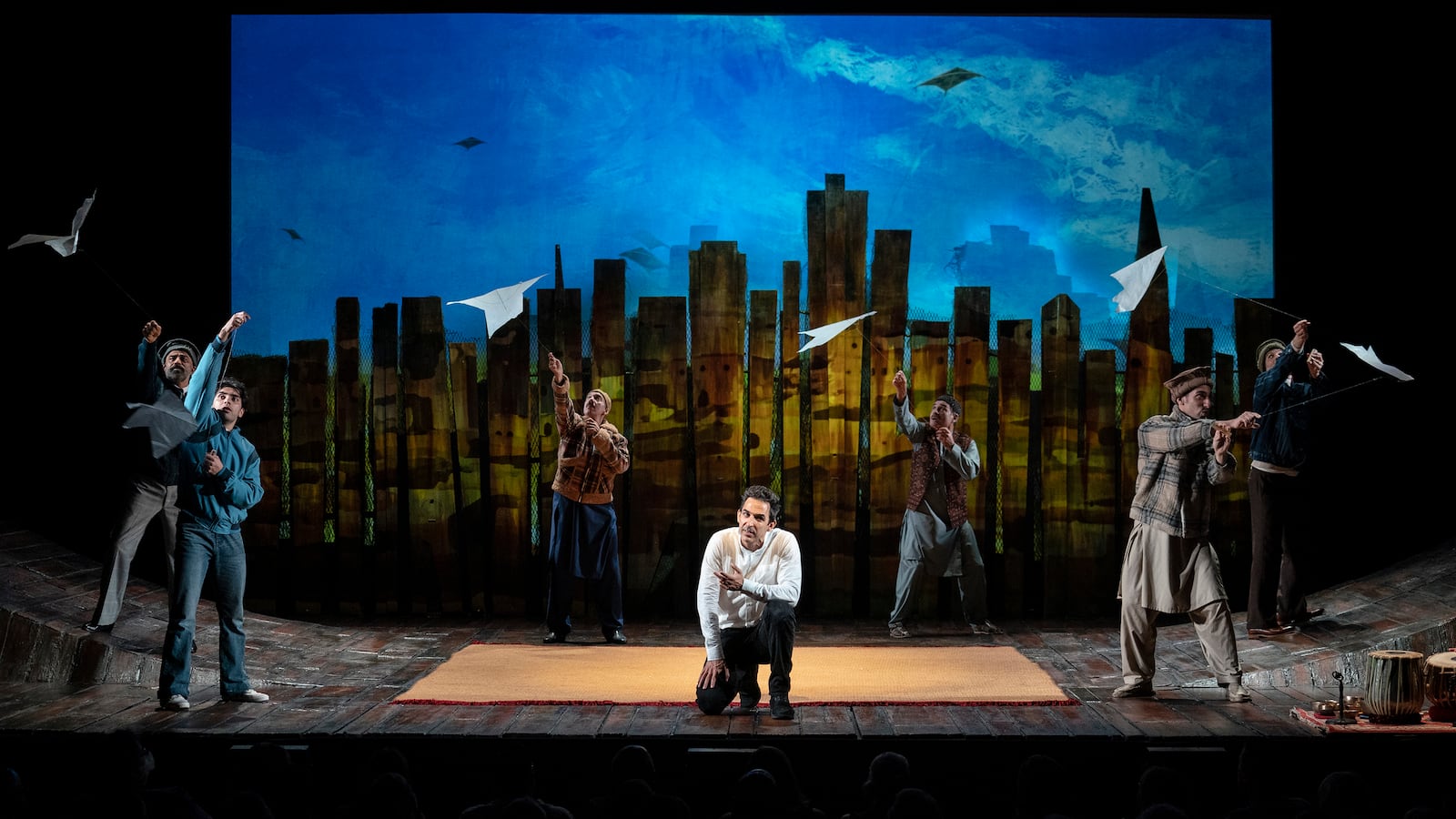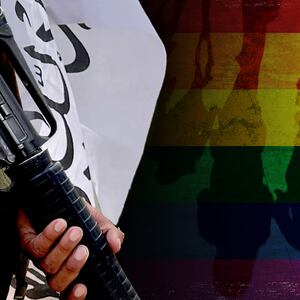Perhaps the makers of The Kite Runner (to October 30, Hayes Theater) would be horrified to think that the message of their Broadway show aligns so closely to the homophobia and poisonous prejudice—“groomers,” “pedophiles” and the rest of it—issuing forth from Republican and right-wing mouths of late. But perhaps they wouldn’t be horrified; after all, right there in front of us, they proudly present a gay psychopath who is also a rapist and pedophile and the villain of their show. What a dream night out for anti-gay bigots they have created.
We do not know much else about Assef (Amir Malaklou). The producers of the show—adapted from Khaled Hosseini’s bestselling novel set in 1970s Afghanistan and America in the 1980s and near-present day—simply make Assef extremely terrible. The manifestation of this evil is his sexuality, which the play inextricably ties to his perverted violence and villainy, which—like a lot in the play—is not discussed or made clear, but still bluntly exploited for plot purposes in this obnoxious production.
The play’s offensive shallowness is exacerbated when considering the present-day plight of LGBTQ Afghans, either trying to stay alive following the Taliban’s takeover or desperately trying to escape the country for their lives.
How ironic that the last production in this theater was baseball drama Take Me Out, which examined issues of sexuality and masculinity (toxic and otherwise) in a far more nuanced and intelligent way. The cheap exploitation of The Kite Runner stands in stark contrast. (Warning: spoilers ahead.)
Protagonist Amir (Amir Arison) narrates the show throughout as an adult, while simultaneously playing a teenage boy in his own story—which looks and sounds odd and stilted. In the winter of 1975 in Kabul, Assef first bullies Amir and his friend and servant Hassan (Eric Sirakian), by calling them “faggot.” The very mention of this word elicited snickering laughter from some of the audience this critic sat among.
Perhaps, one may think charitably, The Kite Runner is making the case that Assef is closeted, or that his abuse somehow orbits above any kind of classification of sexuality. If this is the case, there is no exploration of the source of his self-hatred and violence, or what it might have been like to have been a screwed-up young gay man in 1970s Afghanistan; and it doesn’t bother to chart his journey of, say, a self-loathing teenager to rapist to violent, child-trafficking pedophile and rapist. Assef is just a cipher for evil. The Kite Runner creates a boo-hiss monster, but is not a jot interested in his genesis.
Assef is also a snob, seeking to align himself with the upper-class Pashtuns he and Amir are, as opposed to Hassan, who—along with his father Ali (Evan Zes)—serve Amir and his father Baba (Faran Tahir) and are from the poorer Hazaras. Amir and Hassan are friends, just like their fathers, class distinctions vaporized by collective devotion.
The boys love American cowboy movies, dubbed into Farsi—it is their model of good masculinity; simple stories of hetero, masculine heroes vanquishing villains, rather like the idea The Kite Runner has of itself. Hassan, as well as being “the kite runner” of the play’s title, proudly fetching kite-flying champion Amir’s kite, is a whizz with the slingshot, summoning up images of David slaying Goliath.
Assef seems to flirt, lightly, with Amir. Hassan is then the victim of his violent rape. This rape is observed closely enough for Amir to see Hassan’s blood stain the snow on the ground black. However, the violence happens away from our eyes, which, considering how central the act is to The Kite Runner, is a bizarre choice on the part of producers who likely think they are being tasteful and restrained. In fact, it seems vastly more exploitative than showing it overtly.
The act of a man being raped by another man—played as an unforgivable trespass on the edifice of masculinity, rather than a horrific violation and an experience of violent crime itself—is the throbbing disgust at the center of The Kite Runner. The play asks, but never adequately answers, why Amir did nothing to help or save Hassan that day.
From here on, a freighted silence reigns, as well as a shedload more sadism. Hassan, who is denied any voice apart from doe-eyed expressions of loyalty to Amir, doesn’t talk about what has happened to him, though he remains loyal to Amir, who becomes a whining, annoying, self-justifying coward for the rest of the play until its closing moments.
“There is a way to be good again,” is the incantation that opens and closes the play—but it is lyrical nonsense. Amir is always on stage telling us his thoughts, trying to justify his lack of loyalty to Hassan and his inability to do the right thing. He wants his father to be proud of him, he doesn’t want to shame his father, and to please him—and on and on he gripes. This is not endearing. Unintentionally, it makes him into another villain.
Amir treats Hassan worse and worse after the rape. He hits him. He is rude to him. He isolates him. He treats him as a servant rather than friend. He tries to frame him for thieving, and—because he is so loyal to Amir—Hassan goes along with this awful, additional injustice done against him, and he and his father eventually go into a self-imposed exile. More violence and death await them, again off stage, again unseen and unheard.
Hassan and Ali’s relative muteness as characters feels like an internal snobbery of The Kite Runner’s, which literally silences a victim of rape in the service of an unconvincing journey of redemption undertaken by its hero.
Is Amir disgusted that his friend was raped? He doesn’t seem to care that his friend has had an appalling act of violence done to him. Is he disgusted that he didn’t do anything to help him? That seems to be the play’s self-thesis—the story certainly cannot seem to move beyond Amir’s experience of guilt, and wanting to please his father—but if that’s the case, why does Amir treat Hassan so badly? Why doesn’t he treat himself badly if he feels he's a failure?

Amir Arison and Eric Sirakian in "The Kite Runner."
Joan MarcusHis anger and violence towards Hassan read as further disgust at the violent act his friend endured, rather than his friend’s experience of violence. Why would you persecute a friend you allegedly care for, verbally and physically, after seeing them brutalized? The Kite Runner doesn’t say; it really never digs into its wooden characters.
We see Assef talking shiftily to a male servant at a party held for Amir (yes, gay, we’ve got it by now, thank you!), before war and displacement lead Amir and Baba to San Francisco in 1981, to build a new life. Oddly, in 1981 in San Francisco, gay people do not figure in the list of things that stand out for Amir—but rather football, baseball, and Prince.
How weird for Amir to live in one of the gayest cities on the planet and not notice this, or—in terms of a story device right in front of his creator—use San Francisco’s status as a major gay population center, rich in diversity, to either challenge or deepen the play’s understanding of sexuality. Instead, the sole avatar of homosexuality in The Kite Runner is a despicable rapist and child abuser.
Towards the end of the play, Assef becomes a sadistic Taliban commander, kidnapping, abusing, and trafficking young boys, one of whom is Sohrab, the orphan child of Hassan, played here by the same actor who played Hassan. Sohrab has been dressed up and made up, and Assef makes Sohrab dance for him. It is clear again that he is a pedophile. He is preying on the son of the father he also raped.
Ultimately, and absolutely in line with the cowboy movies Amir loves, a poetic vengeance is visited upon Assef. Quite besides its many thematic deficiencies, this scene, as with many of the key scenes in The Kite Runner, feels rickety and ill-thought-out. Melodramatic twist piles upon melodramatic twist, until Amir says and does something heroic in regards to Sohrab. However, even this moment falls flat, given who his words are said to and how late it comes, and how it is staged. “There is a way to be good again,” we hear again—but Amir seems a 95 percent lacking ambassador of it.
In a play so obsessed with male anxiety about unsayable things, women unsurprisingly have very little to do. First, one nameless female character becomes a victim of near-rape in Baba and Amir’s convoy leaving Afghanistan; but this is merely a plot device to show how pathetic Amir is because his father does what he failed to do with Hassan, and stands up to a potential rapist.
The other significant woman is Soraya (Azita Ghanizada), who Amir falls in love with after they meet at a flea market. She is stereotypically angelic, strong and good and mostly sidelined, which is a shame because Ghanizada brings some much-needed life and sharpness to a frustratingly underwritten part. That Soraya cannot have children is another major factor barely examined; like other significant components of other characters it merely serves to slot the plot of the play into place.

Amir Arison and Amir Malaklou in "The Kite Runner."
Joan MarcusWe never feel the heat of love and passion between Soraya and Amir. She is a supportive rock to him and has no independent presence in the story. Is she really there to make sure we know there is no question about Amir’s own heterosexuality? Later, we learn that Hassan—before he dies off-stage—also married a woman and had Sohrab. Amir seems relieved. Sure, he is happy his friend was happy, but in the bizarre framing of masculinity in the play, the unspoken implication is also “Thank goodness he attained some kind of socially-sanctioned heterosexual normality after being raped by that gay pedophile!”
The passionless warmth and safety of Amir and Soraya’s relationship cast this critic’s mind to the moments when Amir seemed happiest in the play—right at the beginning with Hassan. The standout moments of physical intimacy that we see on stage are between the two boys. And then a hideous act of coercive intimacy breaks them apart, leaving the one character we are meant to think of as a hero wreathed in psychological agony he will not or cannot vocalize. The Kite Runner contains many, perhaps unintended, narratives about masculinity, sexuality, and intimacy it does not have the will, or maybe courage or depth, to confront.
Despite the attractive projections of Afghanistan and San Francisco, there is no relief to be found in the staging of the show. Characters do that weird thing of walking round in circles and to the left and right a bit to convey walking long distances or negotiating spaces with unseen doors or streets. The biggest bizarre design decision is to not feature actual theater-filling, kite-flying. Come on, you’re in a Broadway theater doing The Kite Runner! What about finding a striking way to recreate the amazing races Hosseini evokes so beautifully on the page. But no. Instead, all that lingers is the heavy pall of homophobic, simplistic ugliness—and so many unanswered questions.







